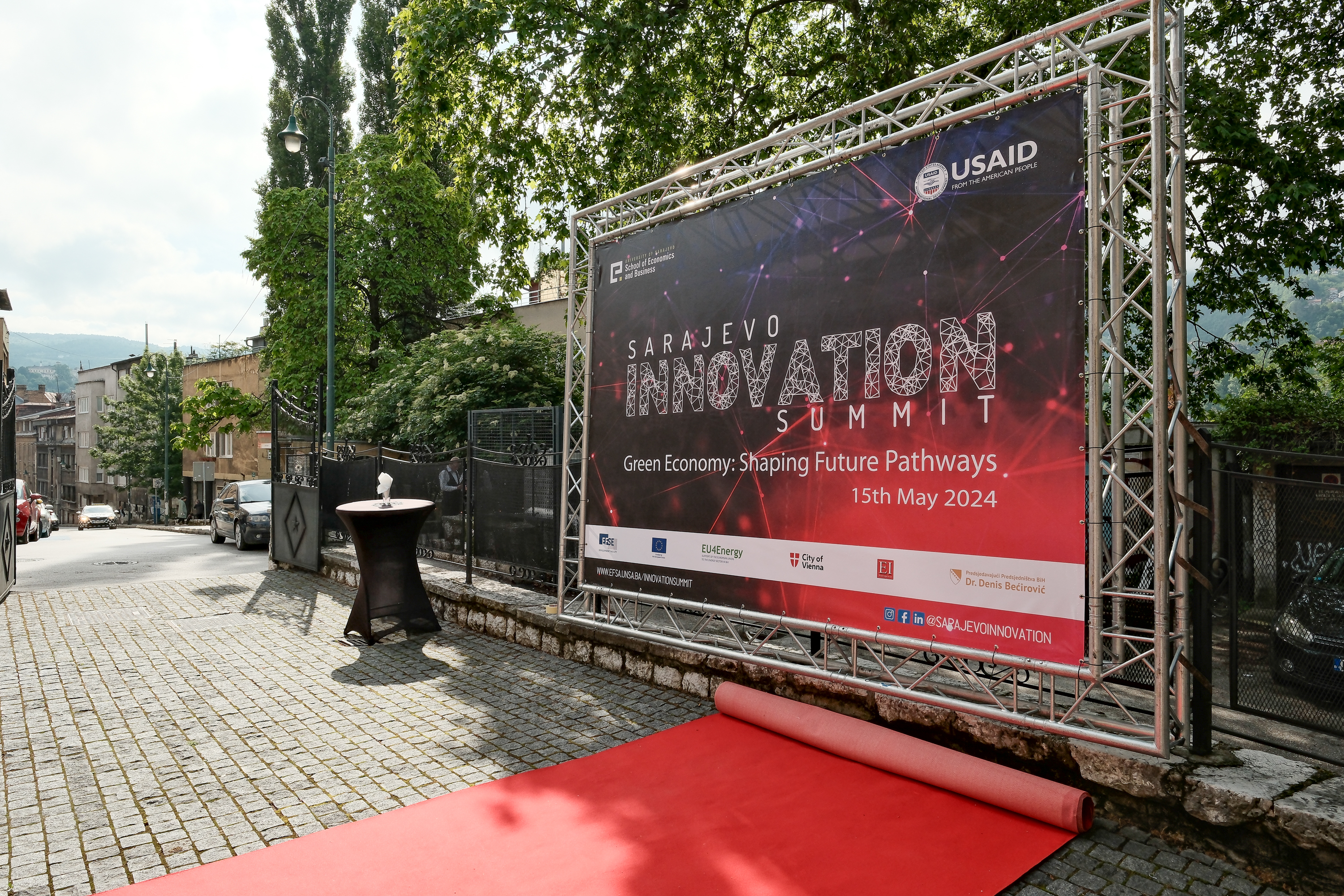Accreditations:
 |  |
Memberships:
 |  |

Yesterday (May 15th), the sixth Sarajevo Innovation Summit was held at the Olympic Museum in Sarajevo, organized by the University of Sarajevo - School of Economics and Business (SEBS) and the Economic Institute Sarajevo in collaboration with the USAID Mission in BiH and the USAID EPA - Energy Assistance Project in BiH, under the high patronage of the Chairman of the BiH Presidency, Dr. Denis Bećirović.
The focus of the 2024 Summit was on the most pressing topics of today - green economy, green innovation, and energy transition. The keynote speakers were the Governor of the Central Bank of BiH, Prof. Dr. Jasmina Selimović, and the Director of the Fraunhofer Institute for Innovation Systems and Research in Germany, Dr. Djerdj Horvat. The Summit was opened by the Dean of the School of Economics in Sarajevo, Prof. Dr. Meliha Bašić, the Minister for Science, Higher Education, and Youth of the Sarajevo Canton, Prof. Dr. Adna Mesihović, the visionary behind the Summit, Prof. Dr. Amila Pilav-Velić, and the Program Coordinator at the EU Delegation to BiH, Dr. Nadia Bergamino.
"Innovations today represent one of the most significant sources of long-term economic growth. Leading economic experts emphasize that 50% of GDP growth in developed economies is solely the result of innovation growth, and in this regard, innovation is one of the 12 pillars of competitiveness. We cannot speak about a functional innovation ecosystem without emphasizing the role of the education system, especially universities as knowledge, research, and innovation hubs. Collaboration in this field, between the education, business, and public sectors, becomes imperative for sustainable economic development. The School of Economics in Sarajevo, as the host of this important event, has recognized all these challenges, and in that sense, we aim to contribute to the identification of useful, new innovative solutions when it comes to the application of green economy and to influence the strengthening of our commitment to sustainability, sustainable energy sources, and innovations" said Dean Bašić.
The founder of the Summit, Prof. Dr. Pilav-Velić, emphasized: "This year's Summit was organized in a completely different format from all previous ones. This time, we provided space for experts whose focus is on green and energy transition, as well as individuals from the business, public, governmental, and academic sectors, and students who are in any way involved in the green economy and transition story. Our intention is to stimulate discussion among key actors specialized in sustainable development, sustainable energy sources, green economy, innovation, and education development when it comes to sustainable development. The green economy implies economic prosperity that does not mean creating profit and generating new value at the expense of the environment but, on the contrary, also implies economic and ecological integrity, as well as social-intergenerational justice. Energy and green transition are extremely complex transitions that also include social and economic transitions, and therefore, it is necessary for all of us - policymakers, decision-makers, business community, public sector, and academic community - to deal with this topic."
Governor Selimović said: "The complexity of the energy transition lies in the fact that it does not only mean a certain economic transition or evolution but a change in the entire technological paradigm, i.e., changes in technology that currently predominantly relies on fossil fuels. This is probably the biggest change that industrial society and civilization have experienced in the last century, and to achieve a carbon-neutral economy by 2050, as required by the Paris Agreement, global investment in the energy sector will require between five and seven trillion US dollars. Despite all efforts to reach these figures, the current level of investment amounts to two trillion dollars annually, so we are lagging behind the set goals. A special challenge lies ahead of our country, ahead of all influential stakeholders who need to act together in this interdisciplinary but inevitable process."
The second keynote speaker, Dr. Horvat, spoke about the importance of digital transformation in the energy transition process and how it affects the innovativeness of companies. "The green transition is hardly conceivable without digital transformation. To achieve the goals set by the EU in the field of energy transition, it is necessary to consider every participant in the ecosystem. It is essential to systematize the microdata of all participants connected in one digital ecosystem. It is crucial to create digital systems for sectoral data interconnection from micro to macro levels, to obtain comprehensive and detailed data based on the individual level. It is necessary to measure new competitiveness factors, such as adapting small and medium-sized enterprises to the requirements of other value chain participants. A recent survey of hundreds of companies in BiH has shown that standard products form the basis of their strategies as suppliers in the value chain, where transformation, innovation, and adaptation to trends do not play a key role. It was also noted that companies are not connected within an innovation ecosystem that should connect scientific and government institutions and industry. All companies emphasized the need for collaborations in the economic and technological ecosystem, and digital transformation is impossible without external support."
Dr. Nadia Bergamino highlighted: "Innovations represent ideas and ways to make things better, to be prepared for change and upcoming challenges, and to have the courage to work on them. The biggest challenge today is how to make energy greener and more sustainable, and this is another reason and occasion for new discussions from which new ideas and solutions for a more energy-sustainable Bosnia and Herzegovina would emerge, as part of the green agenda for the Western Balkans. It is up to us, as well as to other economies of the Western Balkans, to fulfill and enable the necessary conditions for achieving the above."
Within the Summit, a panel session titled "Green Horizons: Exploring Sustainable Energy Solutions" was held, with participation from Rene Pollaschak - Wiener Netze GmbH, Mak Kamenica - USAID EPA, Nikos Tsakalidis - EU4ENERGY, Vedad Vajzović - Greens Ltd.
The panelists discussed challenges and opportunities, as well as innovative solutions for transitioning to a sustainable, green economy. It was emphasized that green financing plays a crucial role in supporting sustainable initiatives, such as renewable energy and environmental projects, ensuring a prosperous future for our planet and society. Supporting small and medium-sized enterprises in Bosnia and Herzegovina for green innovations not only promotes environmental awareness but also strengthens the economy by creating new business opportunities and enhancing competitiveness in the market. The need to improve collaboration across borders and sectors, harness technology and innovation to drive positive change, and advocate for policies that prioritize the health of our planet and its inhabitants was particularly emphasized.
On this occasion, a memorandum of understanding was signed between the University of Sarajevo - School of Economics and Business, the University of Sarajevo - Faculty of Mechanical Engineering, and EU4Energy, to establish cooperation in implementing activities within the framework of the sustainable energy transition process in BiH.
Additionally, this year, within the Summit, in collaboration with the company Greens, the first regional forum for young people, the Future Energy Leaders Forum, was organized for the first time. This forum aims to enable young people to actively engage in shaping a sustainable and cleaner future in our country.
University of Sarajevo - School of Economics and Business